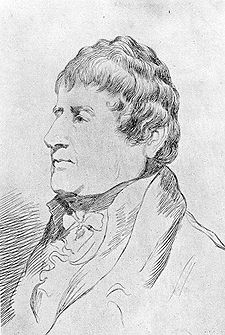- Charles Blagden
-
Charles Brian Blagden 
Born 17 April 1748
Wotton-under-Edge, GloucestershireDied 1820
Arcueil, FranceNationality United Kingdom Known for Studies of perspiration and the freezing point of solutions Notable awards Copley Medal Sir Charles Brian Blagden FRS (17 April 1748 – 1820) was a British physician and scientist.[1] He served as a medical officer in the Army (1776 – 1780) and later held the position of Secretary of the Royal Society (1784 – 1797). Blagden won the Copley Medal in 1788 and was knighted in 1792.
Contents
Science
In June 1783, Blagden, then assistant to Henry Cavendish, visited Antoine Lavoisier in Paris and described how Cavendish had created water by burning "inflammable air".[2] Lavoisier's dissatisfaction with the Cavendish's "dephlogistinization" theory led him to the concept of a chemical reaction, which he reported to the Royal Academy of Sciences on 24 June 1783, effectively founding modern chemistry.
Blagden experimented on human ability to withstand high temperatures. In his report to the Royal Society in 1775, he was first to recognize the role of perspiration in thermoregulation.[3][4]
Blagden's experiments on how dissolved substances like salt affected the freezing point of water led to the discovery that the freezing point of a solution decreases in direct proportion to the concentration of the solution, now called Blagden's Law.[5]
References
- ^ For a summary of Blagden's life and work, see Jungnickel, Christa; McCormmach, Russell (1996). Cavendish. Philadelphia: American Philosophical Society. pp. 212–216. ISBN 0871692201. http://books.google.com/?id=EUoLAAAAIAAJ&pg=PA213&dq=charles+blagden+experiment.
- ^ Brougham, Henry Lord (1839). "Historical Account of the Discovery of the Composition of Water". The Edinburgh New Philosophical Journal 27 (54): 316–324. http://books.google.com/?id=zRgXAAAAYAAJ&pg=PA318&dq=charles+blagden+experiment.
- ^ Blagden, Charles (1775). "Experiments and Observations in an Heated Room". Philosophical Transactions (1683-1775) 65: 111–123. doi:10.1098/rstl.1775.0013. http://www.jstor.org/sici?sici=0260-7085%281775%2965%3C111%3AEAOIAH%3E2.0.CO%3B2-5.
- ^ Blagden, Charles (1775). "Further Experiments and Observations in an Heated Room". Philosophical Transactions (1683-1775) 65: 484–494. doi:10.1098/rstl.1775.0048. http://www.jstor.org/sici?sici=0260-7085%281775%2965%3C484%3AFEAOIA%3E2.0.CO%3B2-B.
- ^ Mellor, Joseph William (1912). Modern Inorganic Chemistry. New York: Longmans, Green, and Company. p. 161. http://books.google.com/?id=wEoJAAAAIAAJ&pg=PA161&dq=Blagden%27s+Law..
Further reading
- Blagden, Charles (1781). "On the Heat of the Water in the Gulf-Stream". Philosophical Transactions 71: 334–344. doi:10.1098/rstl.1781.0042. JSTOR 106528.
- Blagden, Charles (1903). "Letters from Sir Charles Blagden to Sir Joseph Banks on American Natural History and Politics, 1776 - 1786". Bulletin of the New York Public Library 7. http://books.google.com/?id=OvIYAAAAYAAJ&printsec=frontcover&dq=charles+blagden.
- Fauque, Danielle M. E. (Dec. 2008). "An Englishman Abroad: Charles Blagden's Visit to Paris in 1783". Notes and Records of the Royal Society of London (England) 62 (4): 373–90. doi:10.1098/rsnr.2008.0041. ISSN 0035-9149. PMID 19244920.
- Heberden, E. (April 1985). "Correspondence of William Heberden, F.R.S. with the Reverend Stephen Hales and Sir Charles Blagden". Notes and Records of the Royal Society of London (England) 39 (2): 179–89. doi:10.1098/rsnr.1985.0008. ISSN 0035-9149. PMID 11611813.
- Hill, B. (July 1976). "In War and Peace Sir Charles Blagden, M.D.Ed., F.R.S. (1748-1820)". The Practitioner (England) 217 (1297): 126–31. ISSN 0032-6518. PMID 792860.
- De Beer, G. (1954). "Sir Charles Blagden's First Visit to Switzerland". Gesnerus 11 (1-2): 17–35. ISSN 0016-9161. PMID 13232299.
External links
- Blagden Papers at the Royal Society
- Portrait of Sir Charles Blagden by Mary Dawson Turner (National Portrait Gallery)
- National Public Radio story about Blagden
Copley Medallists John Canton (1751) · John Pringle (1752) · Benjamin Franklin (1753) · William Lewis (1754) · John Huxham (1755) · Charles Cavendish (1757) · John Dollond (1758) · John Smeaton (1759) · Benjamin Wilson (1760) · John Canton (1764) · William Brownrigg / Edward Delaval / Henry Cavendish (1766) · John Ellis (1767) · Peter Woulfe (1768) · William Hewson (1769) · William Hamilton (1770) · Matthew Raper (1771) · Joseph Priestley (1772) · John Walsh (1773) · Nevil Maskelyne (1775) · James Cook (1776) · John Mudge (1777) · Charles Hutton (1778) · Samuel Vince (1780) · William Herschel (1781) · Richard Kirwan (1782) · John Goodricke / Thomas Hutchins (1783) · Edward Waring (1784) · William Roy (1785) · John Hunter (1787) · Charles Blagden (1788) · William Morgan (1789) · James Rennell / Jean-André Deluc (1791) · Benjamin Thompson (1792) · Alessandro Volta (1794) · Jesse Ramsden (1795) · George Atwood (1796) · George Shuckburgh-Evelyn / Charles Hatchett (1798) · John Hellins (1799) · Edward Charles Howard (1800)
Complete roster: 1731–1750 · 1751–1800 · 1801–1850 · 1851–1900 · 1901–1950 · 1951–2000 · 2001–present
Categories:- 1748 births
- 1820 deaths
- Fellows of the Royal Society
- Recipients of the Copley Medal
- 19th-century English medical doctors
- 18th-century English medical doctors
- English chemists
- English scientists
- People from Wotton-under-Edge
- 18th-century English people
- 19th-century English people
Wikimedia Foundation. 2010.
